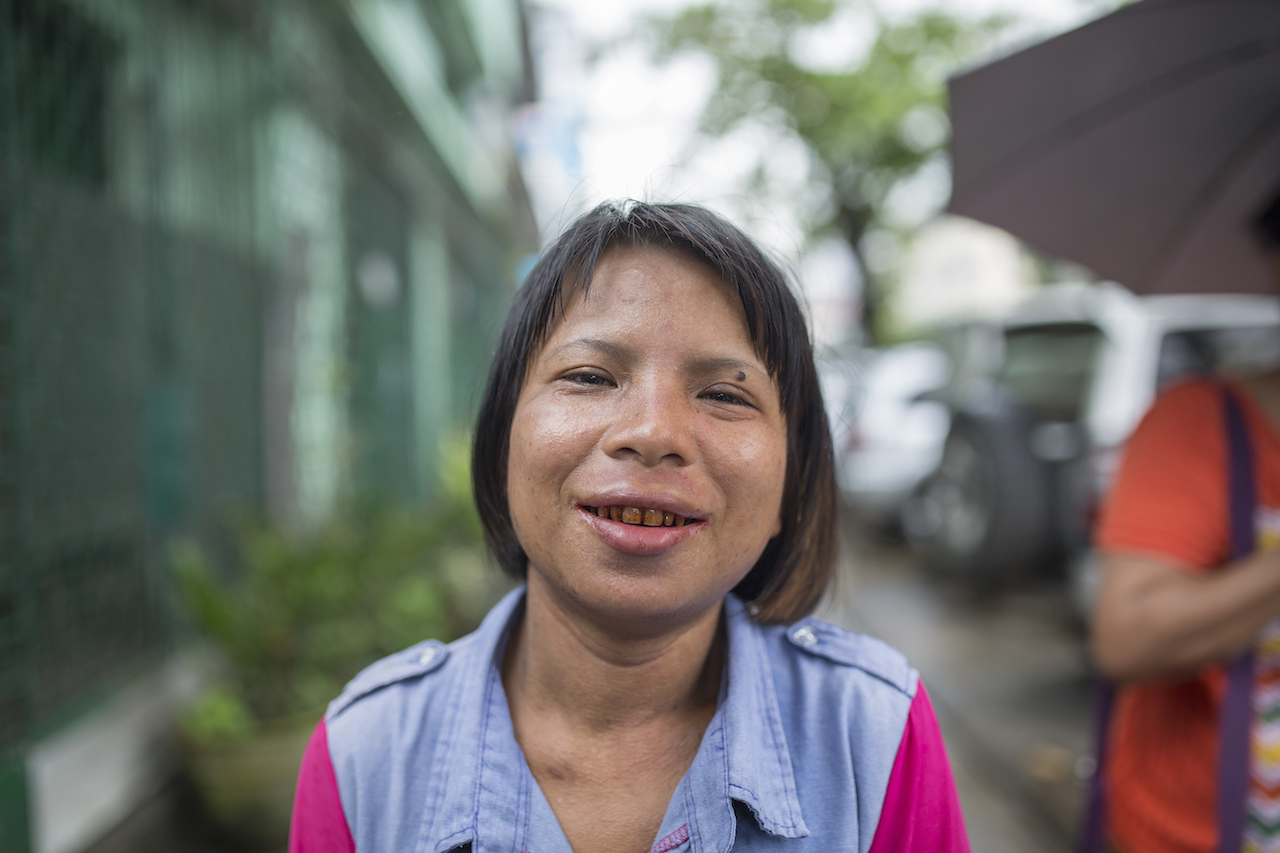Executive Summary
There are more than 600 million betel chewers across Asia and 43 percent of the Myanmar population chews regularly1. Most betel chewers are low-income and spend significant proportions of their household income on betel quid (7.5-10 percent on average). Chewing causes a wide range of serious oral health issues, from severe staining and sensitivity, to chronic inflammation, to a pre-malignant inflammatory disease called Oral Sub Mucous Fibrosis, and oral cancer.
We have developed the world’s first affordable oral health products specifically targeted towards betel chewer health issues. In Myanmar there are more than 150,000 betel shops that rely almost entirely on the sales of betel, and we are using our products to improve incomes of betel sellers, and support diversification away from a total reliance on betel. To date we have built a network of more than 6,000 retailers, who reach more than one million betel chewers per day.
The Problem
There are more than 600 million low-income betel chewers across Asia2. Chewing causes serious oral health issues, from severe staining and sensitivity, to chronic inflammation, a pre-malignant inflammatory disease called Oral Sub Mucous Fibrosis, and oral cancer. Oral cancer is one of the most common cancers across betel chewing countries, and more than 80 percent of cases are preventable.
Betel chewing is a huge business. In Myanmar, more areca nuts (key component in betel nut) are grown than rice. In Taiwan, the market value of areca nuts is greater than rice. We estimate that there are around 10 million farmers in Myanmar growing one of the components of betel quid, and there are more than 150,000 shops that rely almost entirely on sales of betel quid to make a living. Excess areca nuts are exported to India, where there are up to 250 million betel quid chewers.
While there is evidence of betel chewing going back more than 3,000 years and it was long viewed to offer health benefits, the serious negative effects of betel chewing are well accepted. Increasingly betel users express a concern about their oral health or a desire to quit. In Myanmar 78 percent of chewers report wanting to quit, 93 percent suffer from teeth staining, 91 percent report their families wanting them to stop chewing, and 73 percent believe chewing is dangerous for their health. When the new democratically elected government came to power in 2016, reducing the health impacts of betel chewing was featured on their 100-day plan. However, they abandoned these efforts within 14 days amid public concern over the economic impacts of restricting the sale of betel.

Our Approach
We started with the assumption that betel chewing cannot be banned outright. Millions of farmers rely on growing areca nuts and betel leaves, and 150,000 families rely on the sale of the finished product. Furthermore, it is entirely unregulated, no betel shops are registered, and apart from tobacco, none of the ingredients exist in commercial/packaged form. Most tobacco enters Myanmar through illegal border trade with India. In addition, betel chewers face debilitating short and longer term oral health issues, from severe staining and sensitivity in the short term, to pre-cancerous and cancerous conditions in the long term.
We spent more than two years developing affordable oral care products for betel chewers. We collaborated with leading pharmaceutical labs in Europe and Thailand, combining leading expertise in product development with large amounts of customer and scientific data. We established partnerships with experts in the field, including Professor Roger Papke, a neuroscientist and pharmacologist from the University of Florida, who has published extensively on the addictive components of betel quid and its health effects.
Our products are targeted and affordable products that offer both short and longer-term improvements to chewers’ oral health. From our research, chewers regularly complain of short term issues, such as their inability to find well paid jobs or partners because of staining, or their inability to eat certain foods, due to sensitivity. Furthermore, the large majority of chewers are concerned about their long term oral health, but do not have access to oral care products, or a sufficient understanding of their importance.
Our products are clinically proven and we have completed clinical trials to test the world’s first mouthwash and chewing gum for betel chewers, which are designed to reduce mouth sensitivity, inflammation, and staining. As a second phase, we have filed for a provisional patent with the University of Florida for the world’s first addiction cessation therapy targeted towards betel chewers co-developed with Professor Papke.
As our approach is novel, there is significant work to do to measure our impact. While the short-term impacts are clear and customer acceptance is high, our long-term impacts must be measured against a variety of indicators, including large-scale product uptake, controlled oral health studies, use tracking surveys, and self-perception surveys to consider quality of life and overall perceived benefit of product usage.
Product Development & Packaging
Our model is driven by the development of products that improve the oral health of betel chewers. We started our product development process by conducting a thorough study of betel chewers’ problems, wants, and needs. We also conducted research into the types of excipients that are proven to offer benefits to betel chewers. We completed a legal review, considering EU, ASEAN, and specific regulations, and then reached out to potential developer manufacturers. We chose to work with manufacturers offering development services, to avoid the issue of scaling up that can arise when the developer develops a product with excipients that are not readily available to the manufacturer.
Our product strategy relies upon development of the most targeted, affordable products for betel chewers. In order to test the market and reduce our initial investment, we chose to outsource product development and manufacturing. However, we found that while bulk manufacturing can work from a cost of goods perspective, manufacturers either did not have the required packaging machinery, or this increased the cost of goods by up to 10 times the bulk price. We settled on a model whereby we outsource manufacturing of our goods in bulk, import them to Myanmar, and repackage at our Yangon facility. This required extensive legal work to gain the relevant permits for manufacturing and packaging, but offers significant cost of goods reductions.
Market Structure and Our Network
Betel shops are small stalls on the roadside that almost exclusively sell betel quid. Until now there are no companies in Myanmar that distribute directly to these outlets. Our commercial success relies on as many betel chewers as possible purchasing our products regularly. Our products are designed to act as complementary goods to betel quid, so that betel chewers have strong incentives to purchase our products together with betel. Therefore, we are building the first distribution network directly to betel shops. We aim to cover all major towns and cities in Myanmar within 18 months, and then build partnerships with distributors in rural areas with a strong local outreach.
In order to build our network, we hired teams to cover every major street in Yangon and Mandalay, Myanmar’s largest cities. They tracked the precise location of each outlet, and briefly introduced our company. We then developed route maps, and set weekly targets for our sales teams, and developed simple and clear materials so that our sellers and end customers could easily understand product benefits, key ingredients, and usage instructions. While self-distribution has high variable costs, we optimize efficiency by combining operational marketing, distribution, and sales functions. Betel shops are located in close proximity to each other enabling our teams to reach large numbers of outlets per day (between 21-40 depending on the location).
Looking Forward
We are building a business that aims to achieve commercial returns while improving the quality of life and oral health of Asia’s 600 million betel chewers. Our products are combined with an extensive and focused distribution network that goes directly to those that need it most. We achieved a highly competitive cost of goods, through combining outsourcing and insourcing of the manufacturing process, and built partnerships with leading experts on addiction and betel quid. Achieving long-term success relies upon extensive product innovation to develop a wider range of more effective products ultimately to include addiction cessation, and further expanding our distribution network across Myanmar and other betel chewing countries across the Region.
Author Bio
Sam Glatman is from the UK but committed to entrepreneurship in Myanmar. His business focuses on developing tested and affordable treatments to address oral health problems for betel leaf addicts.
The addictive parcels of tobacco and areca nuts wrapped in a betel leaf, leave chewers with stained teeth, sensitivity, inflammation, and oral cancer. Sam has spent two years developing and testing products that improve the oral health of betel chewers (43 percent of Myanmar’s population and 600 million users across Asia). To do this, he established partnerships with some of the world’s leading pharma-manufacturers and experts to create low cost, mass-market consumer products.
Sam was recognized for his work and selected as one of Forbes Asia's 30 Under 30 2018 in the Healthcare & Science category.
He previously set-up Myanmar's leading fresh seafood business, supplying Myanmar’s largest retailer (more than 50 stores), and leading hotels and restaurants. He has advised leading corporations on their entry to Myanmar, including one of Hong Kong’s largest consumer banks and an international law firm.
He holds degrees from University of Oxford, London School of Economics, and National University of Singapore.
1 Baker, Nick. Govt Takes Aim at Betel Us. 2015 June 17. www.mmtimes.com
2 Gupta PC, Warnakulasuriya S. Global epidemiology of areca nut usage. Addict Biol. 2002 Jan;7(1):77–83. dx.doi.org pmid: 11900626



